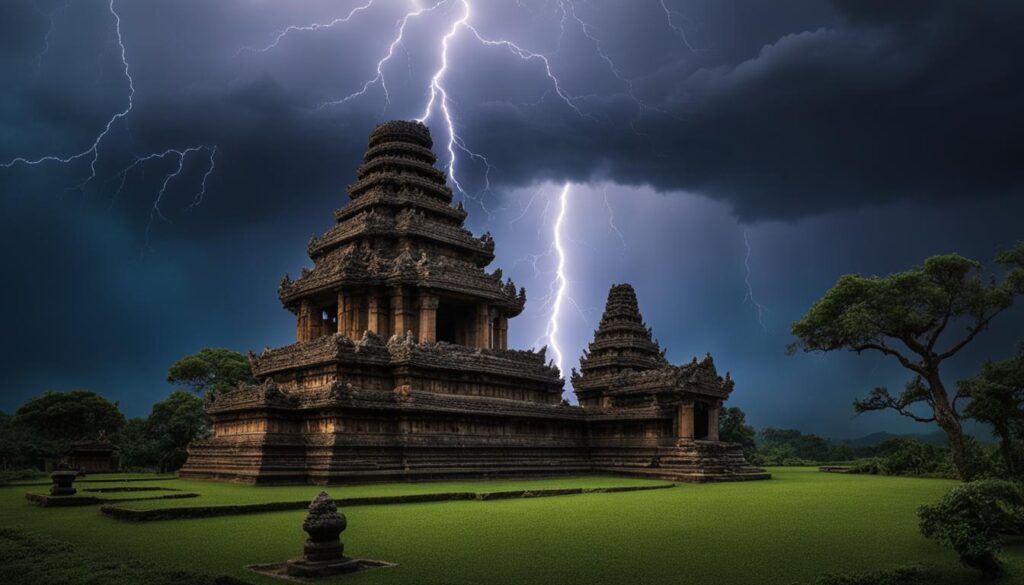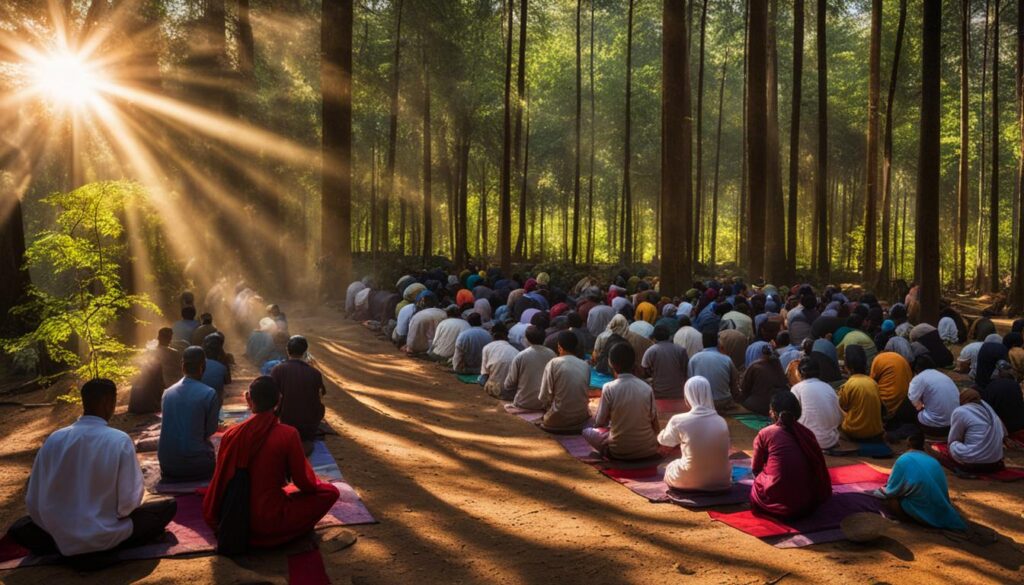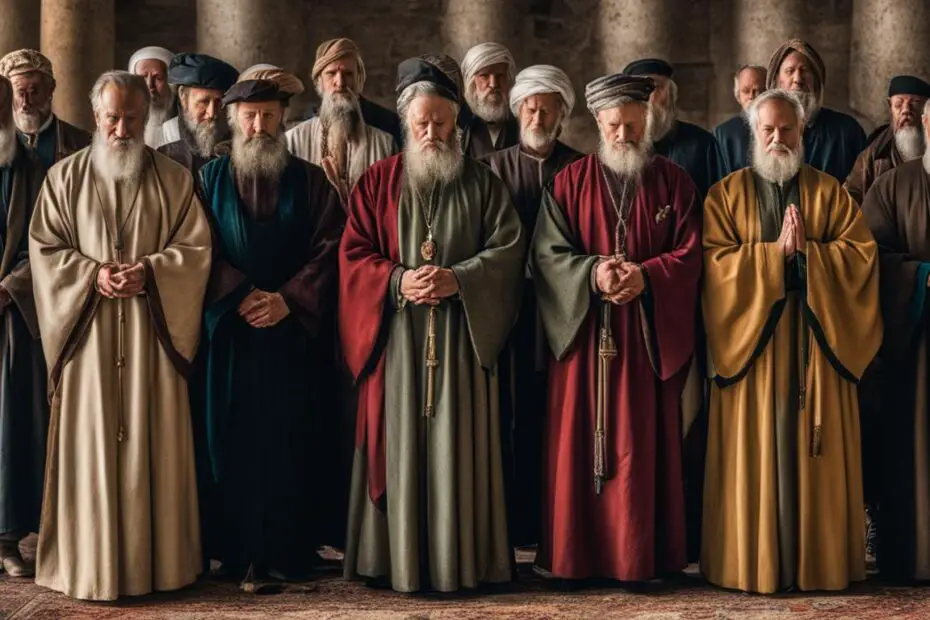Prayer has played a profound role throughout history, shaping the beliefs and practices of various cultures and religions. It has been a powerful tool for connecting with the divine, seeking guidance, and finding solace in times of trouble. From ancient times to the present day, prayer has been intertwined with historical events, traditions, and the evolution of faith. In this article, we will delve into the historical significance of prayer, exploring its impact on different eras, traditions, and the role it has played in shaping the course of history.
Key Takeaways:
- Prayer has played a significant role in shaping historical events and the course of history.
- It has served as a means of connecting with the divine and seeking guidance across various cultures and religions.
- The Lord’s Prayer, spoken by Jesus Christ, serves as a model for believers.
- Jesus’ teachings on prayer provide historical perspectives on its role in the lives of individuals and communities.
- Prayer practices have evolved over time, reflecting cultural and religious changes.
The Lord’s Prayer: A Model for Believers
The Lord’s Prayer holds immense significance in religious gatherings and has been recited and revered for generations. This timeless prayer, spoken by Jesus Christ himself, serves as a model for believers to approach God with reverence, seek His will, trust in His provision, seek forgiveness, and ask for protection. It can be found in the Gospels of Matthew and Luke in the New Testament of the Bible, and its verses encompass various facets of our relationship with God and others.
By exploring the verses of the Lord’s Prayer, we can gain insight into its spiritual significance and its impact on faith throughout different eras in history. The prayer reflects the belief in a loving and merciful God who cares for His creation, provides for their needs, and forgives their transgressions. It encourages believers to have a humble heart, to seek God’s kingdom and will above their own, and to acknowledge their dependence on Him for daily sustenance and protection.
The Lord’s Prayer offers a framework for believers to communicate with God, guiding them in expressing their praise, thanksgiving, and supplications. It reminds believers of the importance of forgiveness and the need to extend it to others, as well as the significance of seeking God’s guidance and protection in the face of temptation and evil. Through the ages, this prayer has provided solace, inspiration, and a sense of unity among believers, transcending cultural and denominational boundaries.
Table: Verses of the Lord’s Prayer
| Verse | Meaning |
|---|---|
| Our Father in heaven, | Recognizing God as our loving Father who is in heaven and holds authority over all. |
| Hallowed be your name. | Expressing reverence and worship toward God, acknowledging His holiness and greatness. |
| Your kingdom come, | Praying for the coming of God’s kingdom on earth and the establishment of His righteous rule. |
| Your will be done, | Submitting to God’s perfect will and seeking His guidance and wisdom in our lives. |
| Give us this day our daily bread, | Asking God to provide for our daily needs, both physical and spiritual. |
| And forgive us our debts, | Seeking God’s forgiveness for our sins and acknowledging our need for His mercy. |
| As we also have forgiven our debtors. | Recognizing the importance of forgiveness and our responsibility to extend it to others. |
| And lead us not into temptation, | Seeking God’s guidance and protection from the snares of temptation and the forces of evil. |
| But deliver us from evil. | Praying for God’s deliverance from the power of evil and the harm it can cause. |
The Teachings of Jesus on Prayer
Jesus’ teachings on prayer provide valuable insights into the historical perspectives on prayer and its significance in the lives of believers. In the Gospels of Matthew and Luke, Jesus communicates the importance of sincerity, faith, and forgiveness in prayer. He emphasizes the transformative power of prayer through his own practice and illustrates its impact through parables and stories.
One of the key teachings of Jesus on prayer is the Lord’s Prayer, a model for believers to approach God with reverence and seek His will. This prayer, spoken by Jesus himself, encompasses various facets of our relationship with God and others. It guides us to trust in God’s provision, seek forgiveness, and ask for protection. The Lord’s Prayer has been recited and revered for generations, serving as a timeless example of prayer practices throughout different eras in history.
“And when you pray, do not heap up empty phrases as the Gentiles do, for they think that they will be heard for their many words. Do not be like them, for your Father knows what you need before you ask him.”
Jesus also teaches the importance of genuine and heartfelt prayers, cautioning against empty phrases and excessive words. He encourages believers to approach prayer with sincerity and trust in the knowledge that God knows our needs. By following Jesus’ teachings, believers gain insight into the historical perspectives on prayer and its role in shaping the lives of individuals and communities.

The Significance of Jesus’ Teachings on Prayer
Jesus’ teachings on prayer hold immense significance as they provide guidance and inspiration for believers throughout history. They offer a framework for approaching prayer with sincerity, faith, and trust in God’s wisdom and provision. By following Jesus’ teachings in prayer, believers can develop a deeper relationship with the divine and experience personal transformation.
Furthermore, Jesus’ teachings on prayer highlight the historical perspectives on prayer and its impact on the lives of individuals and communities. Prayer serves as a means of seeking guidance, finding solace, and fostering a sense of connection to the divine. Through his teachings, Jesus demonstrates the power of prayer to bring about positive change and transform hearts and minds.
The Evolution of Prayer Practices
Throughout history, prayer practices have evolved, adapting to the cultural, social, and religious changes of different civilizations. Ancient prayers offer insight into the early forms of prayer, while modern-day traditions reflect the diverse beliefs and values of societies. By examining the evolution of prayer practices, we can gain a deeper understanding of how prayer has shaped human civilization.
Ancient Prayers: A Glimpse Into the Past
Ancient prayers provide a window into the early practices of prayer and the beliefs of ancient civilizations. For example, the Egyptian civilization had a rich tradition of prayers addressing various gods and goddesses, seeking their favor and protection. The Mesopotamian civilization also had a complex system of prayers, with specific rituals and offerings to communicate with their deities.
Structured and Organized Prayer Rituals
As societies developed and religions formed, prayer rituals became more structured and organized. Prayer practices evolved to include prayers of supplication, thanksgiving, and praise. These rituals provided a framework for believers to communicate with the divine and express their faith. Whether through the recitation of specific prayers, the use of prayer beads, or the performance of physical gestures, prayer became a central component of religious traditions.
Adaptation and Diversity in Modern-Day Prayer
In the modern era, prayer practices continue to evolve, adapting to the changing needs and beliefs of individuals and communities. Different cultures and religions have developed their unique prayer traditions, incorporating specific rituals, prayers, and methods of communication with the divine. From the daily prayers of Muslims to the meditative practices of Buddhists, prayer remains a fundamental aspect of spirituality and personal connection.
In conclusion, the evolution of prayer practices reflects the dynamic nature of human spirituality and the ever-changing cultural and religious landscape. From ancient civilizations to modern-day traditions, prayer has stood the test of time, providing individuals with a means to seek guidance, find solace, and deepen their connection with the divine.
Prayer in Historical Events: A Catalyst for Change
Throughout history, prayer has played a significant role in shaping the course of events and has been a catalyst for change. It has served as a source of solace, strength, and guidance during times of hardship and has empowered individuals and communities to take action. From ancient civilizations to modern-day societies, prayer has been a driving force behind historical narratives and has left a lasting impact on the world.
Prayer played a crucial role in historical events, particularly during periods of war and conflict. It has been a means for individuals to seek divine intervention and protection, as well as a way to find inner peace and courage in the face of adversity. Through prayer, people have united, reinforcing their shared beliefs and values, and fostering a sense of resilience and unity during tumultuous times.
One notable example of prayer’s role in historical events is the Civil Rights Movement in the United States during the 1950s and 1960s. Reverend Martin Luther King Jr., a prominent leader of the movement, often emphasized the power of prayer in inspiring individuals to fight for racial equality and social justice. Prayer gatherings and vigils became a powerful platform for peaceful protest and a way to channel collective energy towards positive change.

Cultural and Religious Traditions of Prayer
Throughout history, prayer has been an integral part of cultural and religious traditions, serving as a means of connecting with the divine, seeking guidance, and expressing gratitude. Different cultures and religions have developed their unique prayer practices, incorporating specific rituals, prayers, and methods of communication with the divine.
In ancient civilizations, such as the Egyptian and Mesopotamian cultures, prayer was deeply intertwined with daily life and religious ceremonies. The Egyptians, for example, had a rich tradition of offering prayers to their gods and goddesses, often through elaborate rituals and offerings. In Mesopotamia, prayers were written on clay tablets and offered to deities as a way to seek favor, protection, and blessings.
In indigenous communities around the world, prayer has been a central part of spiritual practices. Native American tribes, for instance, engage in prayer ceremonies that honor their ancestors, nature, and the interconnectedness of all living beings. These ceremonies often involve chanting, drumming, and dancing as a way to create a sacred space and connect with the spiritual realm.
Table: Examples of Cultural and Religious Prayer Traditions
| Culture/Religion | Prayer Tradition |
|---|---|
| Hinduism | Recitation of mantras and bhajans, offering of prayers and flowers at temples |
| Buddhism | Meditation, recitation of sutras, chanting of prayers and mantras |
| Islam | Five daily prayers (Salah), recitation of the Quran, supplication (Dua) |
| Judaism | Recitation of blessings, prayer at the Western Wall (Kotel), communal prayer services |
| Christianity | Prayer of thanksgiving, intercessory prayer, Lord’s Prayer |
These examples only scratch the surface of the diverse prayer traditions that have existed throughout history. Each culture and religion has its own unique way of approaching prayer, reflecting their beliefs, values, and spiritual practices.
By exploring the historical traditions of prayer, we gain a deeper understanding of the role prayer has played in shaping human culture, spirituality, and the ways in which individuals and communities seek connection with the divine.

The Influence of Prayer on Personal and Social Transformation
Prayer has long been recognized as a powerful force for personal and social transformation. Throughout history, prayer has played a vital role in shaping the course of events and has had a profound impact on individuals, communities, and society as a whole. The role of prayer in historical events has often been a catalyst for change, inspiring individuals to seek justice, reconciliation, and peace. By connecting with a higher power, individuals have found strength, hope, and guidance to address societal issues and bring about positive transformations.
Through prayer, individuals can experience personal growth, resilience, and a sense of connection to something greater than themselves. It provides a space for reflection, introspection, and seeking guidance from a divine source. Prayer acts as a source of strength during difficult times, offering solace, comfort, and support. It encourages individuals to develop empathy, compassion, and a deep understanding of their own values, as well as the values and needs of others.
“Prayer is not asking. It is a longing of the soul. It is daily admission of one’s weakness. It is better in prayer to have a heart without words than words without a heart.” – Mahatma Gandhi
The impact of prayer on society cannot be underestimated. Throughout history, individuals who have had a deep connection with prayer have led movements for social justice, equality, and humanitarian causes. Prayer has fueled their passion, empowered their actions, and provided them with the strength to persevere against all odds. It has served as a rallying cry and a source of unity for communities coming together to tackle common challenges and work towards a shared vision of a better future.
| Historical Event | Role of Prayer |
|---|---|
| American Civil Rights Movement | Prayer provided strength, comfort, and guidance to leaders and activists, fostering unity and resilience in the face of adversity. |
| Women’s Suffrage Movement | Prayer served as a source of inspiration and empowerment for women, fueling their determination to fight for equality and basic rights. |
| Apartheid Resistance in South Africa | Prayer played a significant role in motivating individuals and communities to join the fight against racial segregation and injustice. |
As we reflect on the influence of prayer on personal and social transformation, it becomes clear that prayer has the power to inspire, ignite change, and bring about a more just and compassionate society. It serves as a reminder that our actions, fueled by deep-rooted belief and connection, can create a lasting impact on the world around us.

Conclusion
Prayer has been an integral part of human history, with its significance spanning across cultures, religions, and eras. It has been a powerful tool for seeking solace, guidance, and connection with the divine. Throughout history, prayers have shaped the course of events, influenced personal and social transformation, and played a pivotal role in the lives of individuals and communities.
From the timeless and revered Lord’s Prayer to the teachings of Jesus on prayer, we can gain valuable insights into the spiritual significance and impact of prayer in different historical contexts. The evolution of prayer practices reflects the cultural and religious changes that have shaped human civilization. Ancient prayers offer a glimpse into early forms of communication with the divine, while traditions and rituals have developed over time, reflecting the beliefs and values of diverse cultures.
Prayer has not only influenced personal growth and resilience but has also been a catalyst for positive social change. It has inspired individuals to seek justice, reconciliation, and inner peace, and has played a role in shaping historical narratives and societal transformations. In a world that continues to face complex challenges, the power of prayer remains a source of hope, solace, and guidance for individuals and communities alike.
As we explore the historical significance of prayer and its impact throughout different eras, we gain a deeper appreciation for its role in shaping our world. Prayers throughout history continue to remind us of the enduring power of faith, connecting us to something greater and providing strength in times of uncertainty. In the midst of historical events and personal struggles, prayer remains a timeless practice that offers comfort, encouragement, and a sense of unity.
FAQ
What is the historical significance of prayer?
Prayer has played a profound role throughout history, shaping the beliefs and practices of various cultures and religions. It has been a powerful tool for connecting with the divine, seeking guidance, and finding solace in times of trouble.
What is the Lord’s Prayer and why is it significant?
The Lord’s Prayer is a model prayer spoken by Jesus Christ in the Bible. It serves as a guide for believers to approach God with reverence, seek His will, trust in His provision, seek forgiveness, and ask for protection.
What are Jesus’ teachings on prayer?
Jesus emphasized the importance of sincerity, faith, and forgiveness in prayer. His teachings on prayer can be found in the Gospels, providing instructions on how to pray and highlighting the significance of prayer in the lives of believers.
How have prayer practices evolved over time?
Prayer practices have evolved, reflecting cultural, social, and religious changes. From ancient civilizations to modern-day traditions, various forms of prayer have emerged, each with its unique rituals, beliefs, and methods of communication with the divine.
How has prayer played a role in historical events?
Prayer has often been intertwined with historical events, serving as a catalyst for change and a source of solace during times of hardship. It has played a pivotal role in shaping the course of history, from prayers for peace in times of political upheaval to prayers offered in times of war and conflict.
What are some cultural and religious traditions of prayer?
Prayer has been an integral part of cultural and religious traditions throughout history. Different cultures and religions have developed their unique prayer traditions, incorporating specific rituals, prayers, and practices that reflect their beliefs and values.
How does prayer influence personal and social transformation?
Prayer has the power to transform individuals and communities, fostering personal growth, resilience, and a sense of connection to something greater. It has been a driving force for positive change, inspiring individuals to seek justice, reconciliation, and inner peace.
Why is prayer significant in history?
Prayer has played a significant role in shaping the course of history, influencing individuals, communities, and societies. It has provided a means of connection with the divine, seeking guidance, and fostering personal and social transformation.








